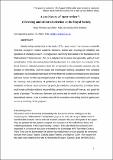A pre-history of ‘peer review’ : refereeing and editorial selection at the Royal Society
Date
25/08/2016Metadata
Show full item recordAbstract
Despite being coined only in the early 1970s, ‘peer review’ has become a powerful rhetorical concept in modern academic discourse, tasked with ensuring the reliability and reputation of scholarly research. Its origins have commonly been dated to the foundation of the Philosophical Transactions in 1665, or to early learned societies more generally, without much consideration of the intervening historical development. It is clear from our analysis of the Royal Society’s editorial practices from the seventeenth to the twentieth centuries, that the function of refereeing, and the social and intellectual meaning associated with scholarly publication, has historically been quite different from the function and meaning now associated with peer review. Refereeing emerged as part of the social practices associated with arranging the meetings and publications of gentlemanly learned societies in the late eighteenth and nineteenth centuries. Such societies had particular needs for processes that, at various times, could create collective editorial responsibility, protect the institutional finances, and guard the award of prestige. The mismatch between that context and the world of modern, professional, international science, helps to explain some of the accusations now being levelled against peer review as not being ‘fit for purpose’.
Citation
Moxham, N & Fyfe, A. 2016. A pre-history of ‘peer review’ : refereeing and editorial selection at the Royal Society. Historical Journal. [Forthcoming]
Publication
Historical Journal
ISSN
0018-246XType
Journal article
Rights
This preprint version prior to peer-review is Copyright (c)2016 the Author(s). The accepted manuscript is also available in accordance with publisher's policies from http://hdl.handle.net/10023/11178
Collections
Items in the St Andrews Research Repository are protected by copyright, with all rights reserved, unless otherwise indicated.

